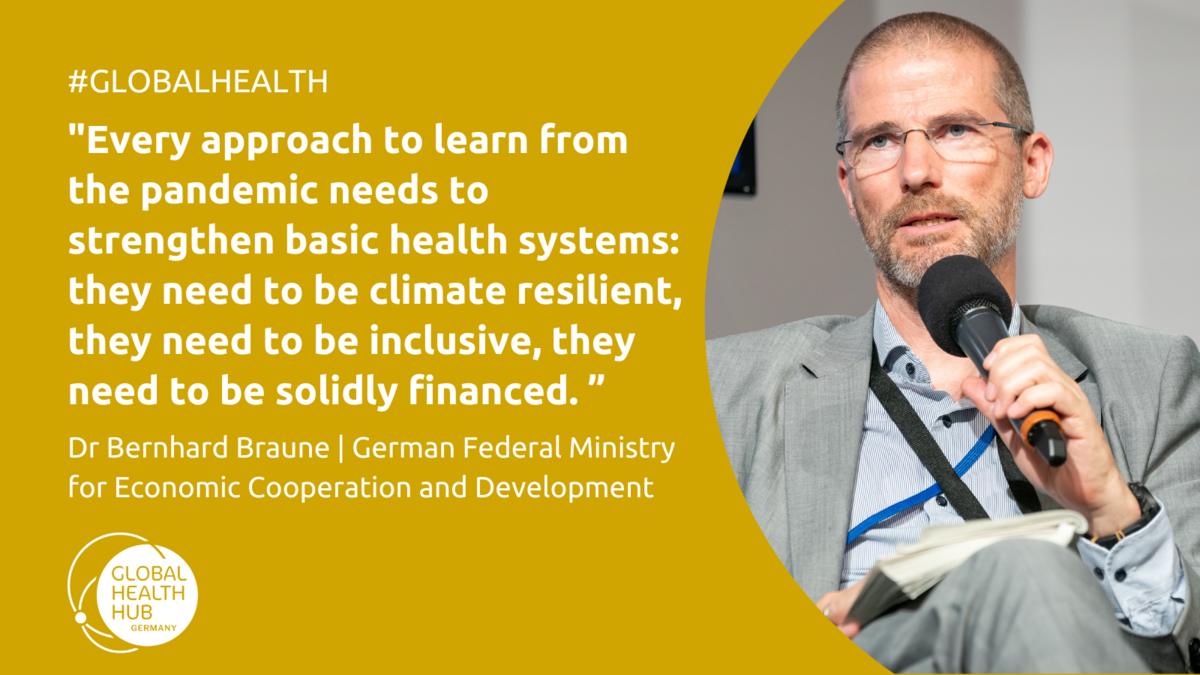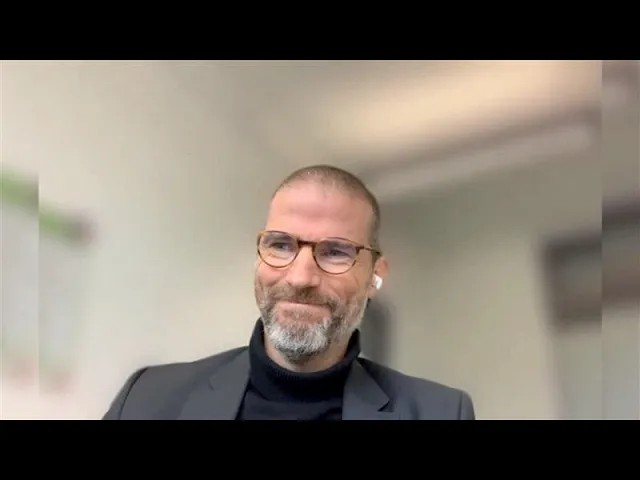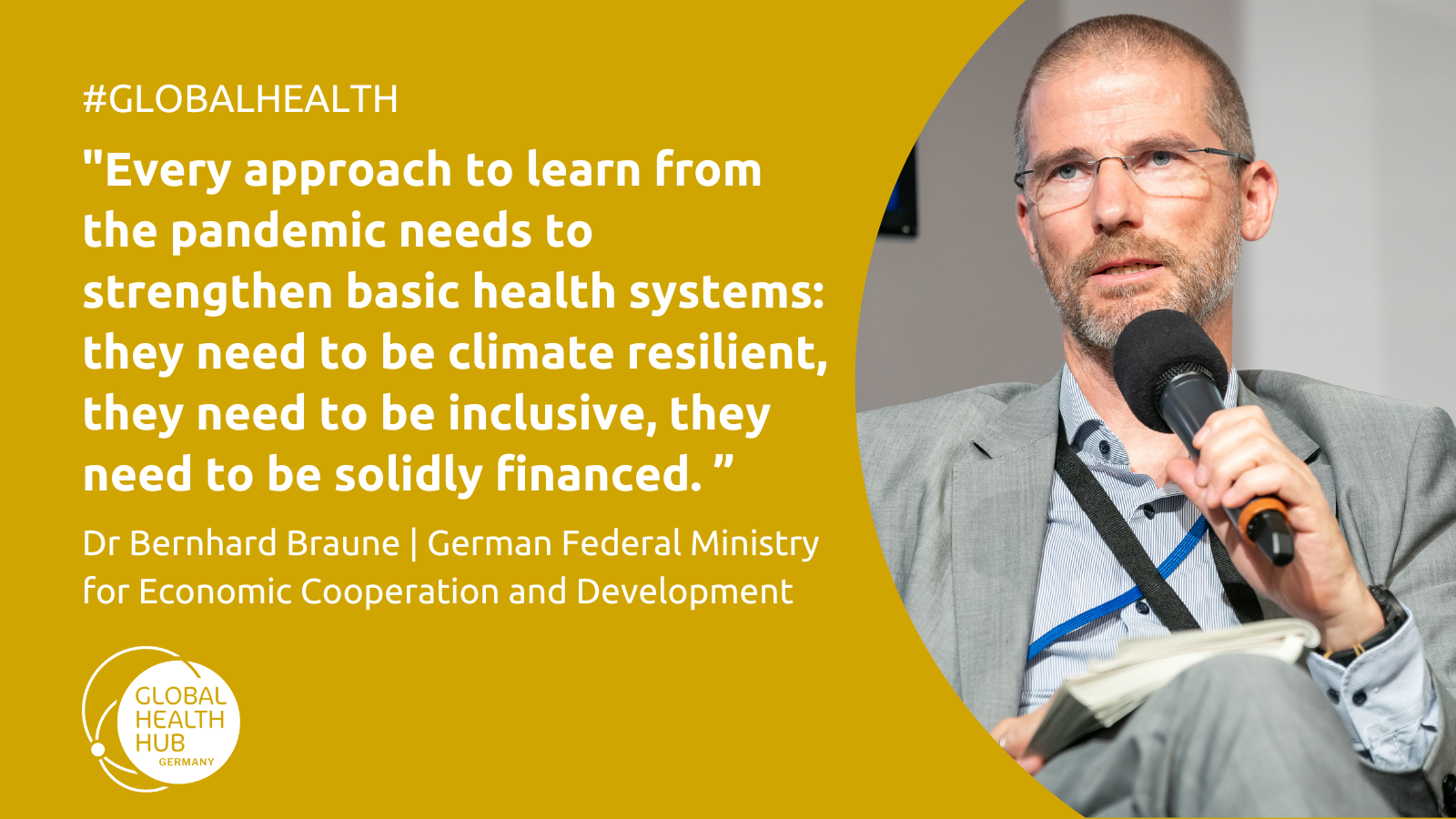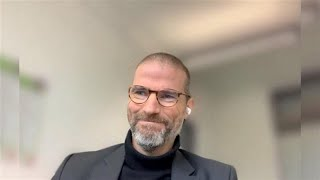Interview with Dr Braune on the BMZ’s priorities regarding Global Health
About the event:
As part of our interview series “The Hub in conversation with...”, members of the parliament and representatives of ministries share insights into their work. For this issue, we interviewed Dr Bernhard Braune, head of the division for global health policy and finance in the German Federal Ministry for Economic Cooperation and Development (BMZ).
The policy priorities for your ministry are addressing the COVID-19 pandemic and preventing future pandemics, pushing back poverty and hunger, forging ahead with a just transition, and embracing a Feminist Development policy. What does that mean for the work of the BMZ?
Bernhard Braune: The four priority areas guide all developmental policy. This means we are looking at these areas in our multilateral activities, our bilateral programming and within the international agenda setting. Important are cross-references, that means strengthening each priority by looking at each respective other priority.
What are current developments that you are especially proud of? And which challenge have you faced lately?
Bernhard Braune: The BMZ had a robust immediate COVID-19 response by reprogramming funds and by advocating for new funds. Our BMZ COVID-19 program of 4.4 million Euro not only looks at the medical aspects of the pandemic, but also the social and economic aspects. On top, we are the second largest contributor to the COVID-19 Platform ACT-A and had a successful COVAX replenishment conference earlier in 2022. However, there were also shortcomings. We understand that the strong support for global solidarity did not reach everybody, and that this caused frustration and inequalities. To start addressing these, we launched the so-called “Last Mile Initiative”, aimed to deliver available global vaccines from the airport to the villages, and to the most vulnerable populations. By doing this in close collaboration with international organisations, bilateral partners and civil society organisations, we really aim to reach those left behind. Moreover, I am happy that in the recent G7 meetings and World Health Summit we had the chance to discuss how we can create markets that can sustain regional vaccine production.
Underlying structural inequalities point towards health systems more generally. Against the prominent focus on pandemic prevention, preparedness, and response, how does the ministry ensure that health system strengthening is continuously supported?
Bernhard Braune: Health systems are the foundation for any robust intervention against pandemics, but also for non-communicable diseases. Every approach to learn from the pandemic needs to strengthen basic health systems: they need to be climate resilient; they need to be inclusive; they need to be solidly financed. You start understanding what weak health systems constitute when you see the despair in parents’ eyes when their children feel sick and there is no help around, which is often the case in low resource countries. That is what drives our work here at the desk: To know that it does have an influence on programs and projects in our partner countries and that it can improve that situation. That is why wider social protection is a focus, including health system financing, health security and insurance schemes. So, a systematic approach is needed because piece meal approaches will not lead to robust answers.

Is a systematic approach also reflected within the Feminist Foreign policy approach which your ministry is actively driving within its work? Could you explain how this approach changes development cooperation in the field of global health?
Bernhard Braune: Within health, the question of a Feminist Development policy is just as pertinent and as in other sectors, but I would argue that with our focus on sexual and reproductive health and rights, we are already quite strong in this sector. However, I want to point out that this approach goes much beyond sexual and reproductive health and rights. It would be a mistake to purely focus on this under the name of a Feminist Development policy. Our minister Svenja Schulze quite ambitiously pointed out that she wants to increase the focus on gender in all project cycles, meaning the Feminist Development policy will also shape, let's say, a bilateral program on technical and vocational training in the water sector and beyond.
Development cooperation necessitates good partnerships. How can we ensure that partnerships are equitable and done in good faith?
Bernhard Braune: How do you balance your own value system and the openness to dialogue with partners that may not always be on the same page? The ultimate tool is dialogue. You need to talk with your partners about your starting and ending points and you need to be willing to be flexible, and to move your position. Of course, that can be challenging when you want to be rooted in your own value system, but this is where politics or where the conversation gets interesting. So, if we don't open up our own systems to our partners, we will not achieve equitable partnerships, and that is to me the key to successful development cooperation.
During one of the panels at the Global Health Talk in July, you mentioned that the global health architecture is complex, but manageable. In fact, you named funding as the key challenge. Which priorities would the BMZ like to see funded and how is the BMZ aiming to achieve this?
Bernhard Braune: My answer is that every funding decision needs to be reflected in view to achieve the Sustainable Development Goal 3 “Health and Wellbeing”. That should be the ultimate strategic goal. If all global health organisations have that goal in mind and ask how they can contribute, then fragmentation within the global health architecture could also become a strength because you have different unique selling points, specialties, and focuses. So, if all these carry onto the same overarching goal – reaching SDG 3 – then diversity will not lead to burdensome fragmentation, but it can really be a strength.
The Global Health Hub Germany is a convener, bringing together over 1500 various actors from eight stakeholder groups. The ministry has been co-funding the Hub for the first time this year, what do you find particularly interesting and relevant about the Hub?
Bernhard Braune: I am a fan of bringing people together to harness diversity through strengthening dialogue. This is how I see the Global Health Hub Germany operating. There are challenges, 1000 plus members cannot all be at the same table – quite literally – so I salute the thematic Hub communities and the different breakup sessions that help to organise. But for me it is important that the Hub remains a platform for dialogue. This creates added value and that is also why we decided to co-fund. Of course, our co-funding came with the objective of introducing more of what we do on a communicative level with our platform Healthy DEvelopments: to create an even more informed discussion on what is already happening in global health.
How could the work of the Hub be further improved to strengthen global health policy?
Bernhard Braune: I would welcome if members of the Global Health Hub Germany would participate financially. I think that would increase ownership and would be a strong sign of validation. Secondly, the Hub is not a fixed organisation, it's not a club, it's a network. As such it is important that it reduces its role as an actor and is more of a convener as you said. If you strengthen once more the unique selling point that the Hub has, while not trying to be another global health organisation in Germany, then you will move even more.
Maybe one more personal question for those who are new in the world of global health: what would be some advice you would give those entering it?
Bernhard Braune: I think curiosity and the will to do things differently create added value. I am impressed by colleagues that know all neglected tropical diseases by heart, but I am not one of them. Not knowing everything can be an advantage because it keeps you asking, and it keeps you open to those that might not know all acronyms, but that are experts on other things. It is important, especially when you work in the political arena, to remain open. That is why I appreciate the rotation system in the BMZ, where after a certain period you have to reorient, you have to reshape, you have to create new networks. Of course, you always bring your old networks and your experiences with you. Afterall, we are experts in development systems, in asking “How can we best make development cooperation work?”. With this knowledge we move from one sector to another and maybe from one region to another. Because the basic principles are the same: building partnership, shaping ownership, looking for capacity development. That is something I bring to the table, despite not knowing all neglected tropical diseases.
The questions were asked by Anna-Lena Hasselder.
Read further interviews from our series “The Hub in conversation with...”:
Interview with Björn Kümmel
Interview with Prof. Andrew Ullmann
Interview with Tina Rudolph
Interview with Dr Bernhard Braune on the BMZ’s priorities and fostering equitable partnerships


